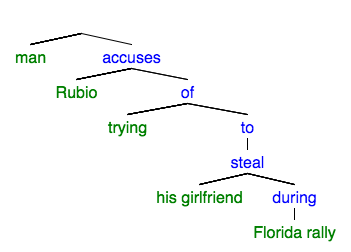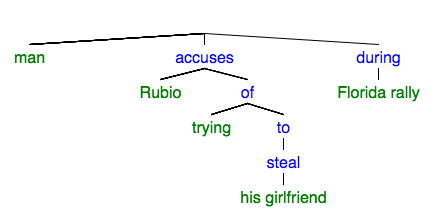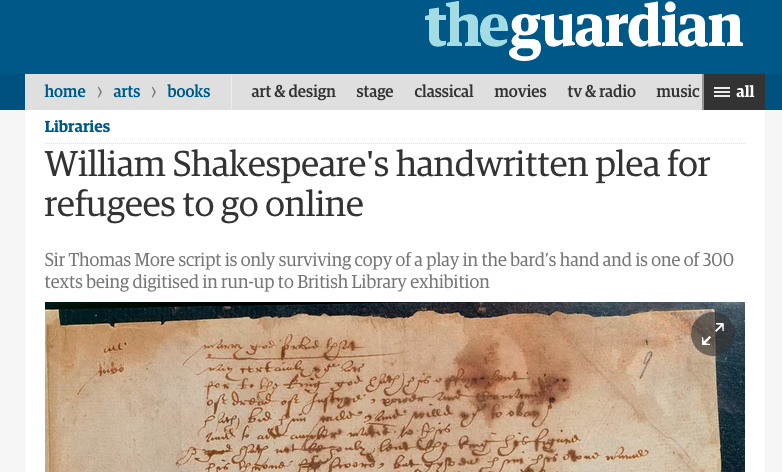Adjunct ambiguity of the week
« previous post | next post »
"Man Accuses Rubio Of Trying To Steal His Girlfriend During Florida Rally".
Is it

or

or something else entirely?
This one is far enough outside the bounds of real-world background knowledge that I don't think there's any basis for accurate guessing.
In fact it seems to be the second case — the alleged stealing took place in New Hampshire, while the accusing took place in Florida.
Update — Bob Ayres points us to the recent headline "Wife of Redskins owner donated to Trump", which surely takes what James Joyce called "the solitary, unique, and, if I may so call it, récherché buscuit":
Update #2 — adjoining another syntactic ambiguity, hectorthebat in the comments points us to "William Shakespeare's handwritten plea for refugees to go online":


Rod Johnson said,
March 14, 2016 @ 11:26 am
Aren't you missing the case where it modifies trying? Or does the temporal scope of trying coincide with that of steal to the extent that there's no difference?
I suppose there's also the "girlfriend during Rubio rally" (like "girlfriend for a day") case as well, but that seems blessedly unlikely.
[(myl) In syntactic terms, there are at least four plausible attachment points for the "during Florida rally" phrase. The constituents headed by steal, trying and accuses are certainly the most plausible ones, with girlfriend (as you say) being less likely on a priori grounds.]
mollymooly said,
March 14, 2016 @ 11:46 am
Also, [man1 [accuses Rubio2 of trying] [to steal his2 girlfriend]]; maybe Rubio's girlfriend is attracted to slackers.
[(myl) Wow.]
Ross Presser said,
March 14, 2016 @ 12:26 pm
Maybe "during Florida rally" attaches to "man" — he was a horse or something the rest of the year, but a man during the rally.
neminem said,
March 14, 2016 @ 12:51 pm
"His" is also technically ambiguous, for that matter – it could also technically be *Rubio's* current girlfriend that Rubio attempted to steal from some other person during that rally (or that he tried to steal some other time, and was accused during the rally, etc.), rather than being the accuser's girlfriend the attempt was made on.
Jason said,
March 14, 2016 @ 2:20 pm
Oh for the love of…
Bloix said,
March 14, 2016 @ 3:48 pm
@Jason said: But these inventive constructions are evidence of why natural language does not require the precision of machine language. We've had discussions before about why, say, legal statutes can be ambiguous, and one answer is that a statute occupies a middle ground between natural language and formal logic – sometimes a draftsperson hews too closely to natural language, allowing formal ambiguities to be advanced by people who are creatively trying to misunderstand (just as mollymooly and others are trying to misunderstand).
Daniel Barkalow said,
March 14, 2016 @ 5:24 pm
I like that this post declares the Rubio headline to be the [[adjunct ambiguity] of the week], and then tacks on the better Trump headline with tense/voice confusion, which is therefore the [adjunct [ambiguity of the week]].
hectorthebat said,
March 15, 2016 @ 5:01 am
How about today's Guardian headline: "William Shakespeare's handwritten plea for refugees to go online" http://www.theguardian.com/books/2016/mar/15/william-shakespeare-handwritten-plea-for-refugees-online-sir-thomas-more-script-play-british-library-exhibition
Glen Gentoras said,
March 15, 2016 @ 10:58 am
Unambiguous:
"Man accuses Rubio[,] during Florida Rally[,] of trying to Steal his girlfriend."
or:
"Man accuses Rubio of trying to Steal[,] during Florida Rally[,] his Girlfriend."
Xmun said,
March 16, 2016 @ 6:14 pm
There's nothing wrong with the Guardian headline. Everyone knows that Shakespeare knew nothing about making an online plea, so it must be read as (subject) "William Shakespeare's handwritten plea for refugees" followed by (predicate) "to go online", not (subject) "William Shakespeare's handwritten plea" followed by (adjunct, or whatever) "for refugees to go online".